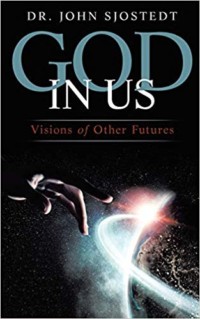Title: God In Us: Visions of Other Futures
Author: Dr. John Sjostedt
Publisher: Matchstick Literary
ISBN: 978-1-6455-0724-6
Genre: Religion
Pages: 148
Reviewed by: Allison Walker
Pacific Book Review
Author John Sjostedt doesn’t believe in hearing the voice of God or archangels or other deities, in your head or in real life. As he puts it, he once “unkindly labeled Moses an undiagnosed schizophrenic.” Nevertheless, one day as Sjostedt was meditating, an idea began to form in his mind. It pushed aside the Japanese haiku he usually focuses on, and brought together years of musings and ramblings on God and Christianity. The idea was a consolidation of years of research and it eventually became Sjostedt’s new book, God In Us: Visions of Other Futures. Of his book, Sjostedt writes, “It will be controversial if it ever becomes known or, heaven forbid, published.”
God In Us: Visions of Other Futures challenges everything you believe. While Sjostedt studies a variety of religions, it is not accurate to call his book Christian, nor Jewish, nor pagan. “God In Us” is all of these and none of them. It is an immense research effort encompassing numerous, varied sources. There are elements of Old and New Testament, King James’ Bible and other versions, the Kabbalah, Dr. Doreen Virtue’s “Earth Angels,” and many others, combined with the author’s own fanciful speculation. Sjostedt calls into question the power and corruption of organized religion, and compares the church to political leaders and governments. After a detailed reflection on the origin and purpose of God’s first angel, Lucifer, the Morning Star or the Shining One, Sjostedt writes, “Like our national and political leaders, who need a foil, an adversary to continuously oppose, so it is with religions and their leaders.”
Beautifully researched and thought over, “God In Us” reveals information not commonly known or taught. Sjostedt’s research reveals the society in which Jesus, the Christian messiah believed to be God’s son born to a human mother, grows up and becomes a prophet. Sjostedt believes Jesus to be one of the Elohim, or angels, sent to earth to deliver a message of acceptance and goodwill, but he doesn’t necessarily believe Jesus performed the outstanding miracles many people would have you believe. Jesus was born to the Essene sect of Judaism, Sjostedt explains, an ultra-strict community somewhat lacking in power during the time. Essene scrolls were intended to be read two ways, one literal reading for an ordinary layperson, and a deeper secondary meaning which only someone trained to interpret the deep symbolism of their culture would understand. Delving into the miracles of Jesus, Sjostedt offers a fascinating, new way to read scripture, and one that may be more deferential to the people who raised Elohim Jesus on earth.
God In Us doesn’t call any one belief right or wrong; it calls them all into question equally. Maybe Sjostedt’s book is instagatory, but it’s also important. In an increasingly fast-paced society where social media means you never have to hear or read a disagreeing opinion, “God In Us” asks you to question what you believed to be true. No matter what controversy God In Us brings to readers or society, it is a book which must be published.


